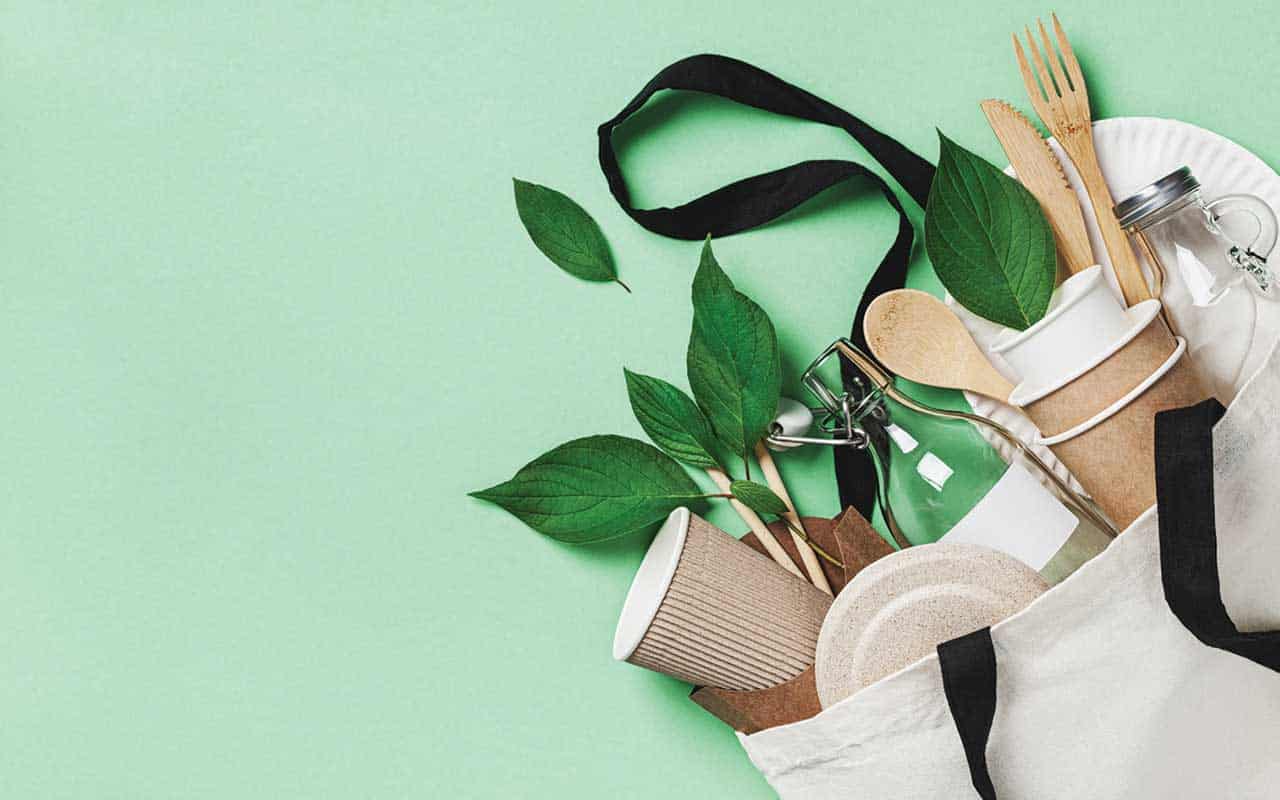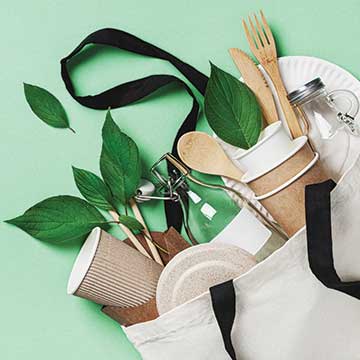This Month’s Featured Article

Sustainable Sustainability
 I’m going to start this article with some important science because we all know attention wanes pretty quickly a few sentences in, and before I lose you I need to justify why small – and large – actions on behalf of our planet are scientifically necessary.
I’m going to start this article with some important science because we all know attention wanes pretty quickly a few sentences in, and before I lose you I need to justify why small – and large – actions on behalf of our planet are scientifically necessary.
What’s the matter with the planet?
The Earth is a closed system. Essentially nothing enters or leaves the system, unless we get hit by a meteor. Then something is definitely entering. This means that we have finite natural resources at our disposal and nowhere for our waste to go after we use them.
The atomic matter that composes our planet and biosphere is all that we have. And according to the Law of Conservation of Mass, matter can’t be created or destroyed – it can only be rearranged to form other things. The total amount of matter doesn’t change.
This essentially means that the quantity of elements, such as carbon (a key player in environmental issues), won’t increase or decrease. However, it can change how it is bonded with other elements and where it resides, e.g., safely sequestered in the ground or in our plastics, fuel, and atmosphere.
Frankenstein’s monster
Being that humans are so intelligent, we have figured out how to alter atomic matter to suit our purposes in ways that make them unable to naturally decompose or re-enter the Earth’s system in another form. Carbon and petroleum-based plastic is an example of this.
Because we’ve made plastic through bonding carbon with other elemental ingredients in unnatural ways it’s a new combination introduced in our closed system. There are no bacteria that can decompose it and no animal that can digest it, which is why we are awash in it today.
Spaceship Earth
Additionally, the Earth is thought to have a carrying capacity, which is the number of people we can support with the finite natural resources we possess. There’s only so much to go around. Currently, we’re overusing and mistreating these finite resources, such as air and water, for the number of people who occupy the planet now and will occupy it in the future.
Baby steps and giant steps
These facts leave us with the need to live in ways that lessen the strain on Mother Earth. I believe that small acts, sustained with intention, will over time snowball into bigger more meaningful acts. Once we start discovering the positive impact we can have, we’ll be hooked and want to do more.
Let’s start with some of these baby steps toward a more sustainable life. I’ll share some ways I’m trying to do better. Believe me, I’m no enviro-saint. I make mistakes, choose convenience over conservation as I go through my hectic day, and let complacency crowd out intention. But I’m working on it and learning as I go along.
Don’t be tare-ified of bulk shopping
One day I’ll discover in therapy why I’ve been so intimidated by the thought of bulk shopping. The process has seemed mysterious, overwhelming, and hard. Well, guess what – it’s super easy and now I’m wondering why I waited so long!
My first foray into bulk shopping was in Great Barrington, MA, first at the Big Y and then the big leagues at the Berkshire Food Co-op. The Big Y has a well-stocked bulk section with dried beans, rice, granola, nuts, trail mixes, and more.
Brown bags with clear cellophane windows are available to use, making it unnecessary to bring my own containers. Plus, being in a larger grocery store I felt a little less conspicuous when I had some lentil spillage due to a misaligned bag and rice overflow when I didn’t close the chute fast enough. Pencils were available to write the product code and these were entered at check out when the product was weighed.
Next, I tackled the Berkshire Co-op bulk section. This time I came armed with various sized jars that I saved from jams, sauces, pickles and the like. To not feel overwhelmed, I arrived bright and early on a Saturday morning. The thought of bulk shopping at peak hours filled me with terror.
But this was my morning – I marched to the checkout register and announced myself as a virgin bulk shopper. The young clerk looked at me quizzically and then kindly weighed, or tared, my assortment of empty jars. This is done so that container weight is deducted at checkout so you’re not paying for it.
From there I made my way to the bulk aisle and surveyed my choices. A vast wall of dry selections were on offer, including a comprehensive spice area. In addition, there was bulk olive oil, vinegar, shampoo, conditioner, body cream, and Dr. Bronner’s castile soap.
I filled my jars with whole oats, Aborio rice, sunflower seeds, and as a reward for my bravery – dark chocolate-covered raisins. Having labelled the jars with product codes written on masking tape I breezed through checkout without a hitch. I now have a tote filled with empty jars in the back of my car for the next time and an incrementally smaller plastic packaging footprint. When I return to the Co-op, the anticipation of refilling empty shampoo and conditioner containers makes me giddy.
Hanging them out to dry
My laundry room is one place I’ve been able to reduce my environmental footprint. While I’ve been using biodegradable laundry detergent in my high-efficiency machine, since August I’ve set my washing machine to tap cold and have left it there, except for the occasional hot wash with some of my sons’ more questionable additions to the load.
I purchased two drying racks and have reserved the dryer for very large items and those occasions where time is of the essence. When I do use the dryer I use wool felt dryer balls instead of dryer sheets.
In good weather, these drying racks are outside on my deck, lending the spiritual calm of Tibetan prayer flags as the kids’ colored T-shirts sway in the breeze. This winter the racks have been a fixture in my living room. Who’s got time for company anyway? And so what if I settle down in crisp clean sheets that smell like the curry dinner we ate across the room.
Hanging laundry has encouraged adulting in my own children. Yes, this is a word. It means behaving like an adult, especially when it comes to doing necessary everyday tasks – like laundry. I enforced the no-dryer rule and they’re responsible for doing their laundry, hanging it on the rack properly and with enough time for it to dry before they need it. A few occasions of wearing damp underwear have taught them to plan better.
I’ve also educated them that just because clothes are lying on the floor, it doesn’t mean they’re dirty. Chucking once-worn jeans and sweatshirts in the laundry bin in lieu of folding and putting them back in the drawer is strongly discouraged.
Not shirting you
For years, we’ve been sending my husband’s white button-down work shirts to be professionally laundered. While I recycle hangers back, I’ve been chagrined at the big piece of plastic wrap that covers them and ends up in a large ball in my garbage bin.
I started washing, hanging, and ironing them myself. Yes, I know this sounds very traditional but here’s the good part – I keep a tally and literally pay myself $3 (the cost of sending them out) for every shirt. Lest this sounds a little strange, there’s an app called Tip Yourself that encourages the same kind of behavior.
Since the summer, I have earned over $300, reduced my footprint again, and streamed countless shows during my weekly ironing time. Slow plodding series like Doc Martin are the best since action-based plots like The Walking Dead can lead to brown burn spots from an iron left too long – you can take your eyes off Martin Clunes but who can take their eyes off a zombie?
Bring your own
There are many bring-your-own items that can reduce your plastic footprint. This requires organization and forethought. I confess I’m not perfect in my record on this but I am moving along the continuum.
Bring your own water bottle and for goodness sake stop buying the plastic bottles. We are drowning in plastic and as we learned it doesn’t disappear, it just gets broken down into microbeads that are finding their way into everything – including our food and water.
Stop putting your leftovers and lunches in plastic bags. Use empty jars and containers instead. There’s also reusable and washable beeswax food wrap for keeping food fresh. Buy a set of metal travel cutlery that goes into your lunch box or pick up spare ones at a thrift store or garage sale.
Ditch the plastic straws and sip from the cup, or buy the paper or metal versions.
When eating meals out, bring your own containers for leftovers. I confess, I have never done this. Our family has a collective huge appetite and what one person can’t finish, another will.
When shopping, don’t forget to BYOB – bring your own bags. Leave them in your car and after you unload your groceries, put them right in front of the door so you’ll trip on them on your way out.
Save what you love
Jacques Cousteau declared, “You can’t save what you don’t love, and you can’t love what you don’t know.” If we don’t feel connected to or knowledgeable about the natural world, we will feel less inclined to be concerned about it.
One way to love the environment is to get out into the natural world and appreciate its beauty and proven therapeutic effects. Take a hike, bathe in the forest, swim in a lake, camp, dig a garden, birdwatch, look out your window – do something that incorporates you appreciating what’s around you and gets you feeling better because of it.
Environmental sustainability is one of the key civic issues of our time and we need to be educated about it from all angles – science, history, arts, literature, and religion and spirituality. It requires a cultural shift from Earth as an unlimited treasure chest for human use and abuse to Earth as a system that we’re part of, like every other organism on the planet.
Glocal action
Individual action can sometimes make you feel like you’re on a lonely planet. If that happens, just look around and see the number of local initiatives in our towns.
For example, in New York State, the Climate Smart Communities (CSC) program supports local governments in reducing greenhouse gas and adapting to a changing climate through technical assistance and grants. Many towns in our area are part of the CSC network.
In February 2018, the Town of North East passed a resolution to become a Climate Smart Community and appointed a task force to take action on the pledge. This task force, headed by Kathy Chow, has been busy evaluating environmental assets, concerns, policies and procedures.
In celebration of Earth Day, Chow and fellow task force member Jennifer Dowley, who is spearheading Earth Day festivities, have a line-up of events to celebrate the Earth and educate us on ways we can make an impact. Seed libraries, bee hotels, community clean up, clothing swap, and electric car show are just some of the programs that highlight the town’s efforts to build a “strong commitment to preserve the environment and ecosystems.”
VOTE GREEN – at the ballot and with your wallet
The environment is a high-priority item for all of us. To help educate yourself about candidates and their green track record, take a look at their League of Conservation Voters National Environmental Scorecard. It rates how well that person represents the environment – and you. There’s also a chapter in your state that addresses more local and regional environmental issues.
Make a donation to a conservation or environmental advocacy group in your local area or one with a more national or global reach. Local land trusts, Audubon Centers, nature preserves, environmental education organizations, and working forests abound in our area – support them. On a larger scale, educate yourself about issues through websites such as Sierra Club, World Wildlife Fund, National Audubon Society, and Natural Resource Defense Council and then donate or advocate.
The Environmental Working Group (EWG) is a non-partisan organization that conducts research and educates consumers about the products we use. EWG’s site is a rife with analyses of products we use in our home and on our bodies. It explores the impact of these products on our health and the health of the environment. Seek out those products that make environmental sense and buy them when your budget allows.
Intentions and acts lead to a better planet
We’re all busy – too busy. Incorporating green behavior allows us to claw back some of our attention from convenience and consumerism and put it toward conservation and conscious living. Doing this is an act of rebellion every day against those who tell us it’s business as usual and everything will be fine and marketers who convince us our emotional needs will be satisfied if we buy this, give our children that, and amass possessions that demonstrate status.
To recenter yourself and give you a crash course on environmental sustainability in easy-to-understand terms, read The Lorax by Dr. Suess. If you’ve read it before as a child, read it again. It’s a cautionary tale about capitalism’s unchecked ravages to the environment, delivered with whimsical illustrations and catchy verse. It ends with a whisper of hope – “UNLESS someone like you cares a whole awful lot, nothing is going to get better, it’s not.”
Go on, take one small step for the planet, then another. Your baby steps will lead to giant steps, larger acts, a better informed and caring citizenry, and a sustainable planet.
The Millerton Earth Day will be on Saturday, April 25 from 10am to 3pm in various locations around the Village. For a schedule of events, visit www.millertonnewyork.com.
Here are the websites referenced in this article: League of Conservation Voters www.lcv.org/; Environmental Working Group www.ewg.org/; NY Climate Smart Communities climatesmart.ny.gov/; Sierra Club www.sierraclub.org/; World Wildlife Fund www.worldwildlife.org/; National Audubon Society www.audubon.org/; Natural Resource Defense Council www.nrdc.org/; The Lorax Project www.seussville.com/educators/the-lorax-project/.


